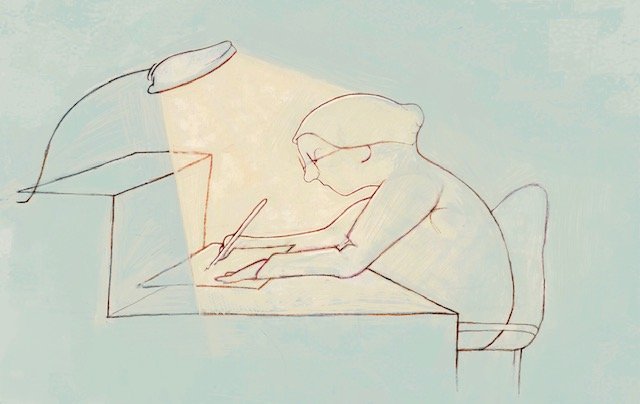How the Practice of Putting Pen to Paper Can Improve Your Product Leadership
“Jottings” by “Jottings” by artinker.com for Kate Leto
My older brother recently passed away. It was very sudden and unexpected. As I ride the waves of grief over the past several days, I’ve started to think about all the memories and stories from growing up with someone who I consider a remarkable human. (Albeit growing up, I thought of him more as the annoying brother who kept stealing the TV remote control; my how times change!)
I have been desperate to capture memories, images and emotions and piece them together into something I can share at his upcoming celebration of life. I talked with a friend of mine who is a professor in creative writing and award-winning poet for some advice on how to tackle this seemingly impossible task. Step one, she said, was “write them down. Use paper and pencil, not a keyboard.”
When I asked why, she said simply, “it’s more organic. You are connecting more directly with the thought.”
It was one of those moments when I was being given a taste of my own medicine. I’m constantly telling my coaching clients to capture their thoughts, to track their actions, decisions, fears, doubts and concerns by just writing them down. “Grab a pen or pencil and write it down!”
The action of doing just that over the past few days has given me a much needed release and has made me even more curious about the benefits of actually stepping away from the digital device and using pen or pencil and paper to help process emotions, events and thoughts - be it for personal or professional situations.
My curiosity about the power of the written vs. typed word has led to a deeper exploration into whether or not there are proven benefits to a hand-writing practice. And, I’m delighted to say the answer is a resounding YES.
The Benefits of a Hand Writing Practice
“We write to taste life twice, in the moment and in retrospect.”
- Anaïs Nin, essayist & novelist
These benefits range from emotional, psychological, and even physical - Smyth, Stone, Hurewitz, and Kaell (1999) found that patients who journaled about events in their lives had several health improvements over the control groups. Study after study shows that there are benefits not only to taking notes, but very specifically to writing things by hand. Capturing thoughts and details on digital devices is still effective for memory retention, but to a noticeably lesser degree, in all studies.
Writing, for example, allows the writer to concretise abstract ideas and to “connect the dots in their knowledge,” according to the National Commission on Writing in America’s Schools and Colleges. Writing might be beneficial to cognitive skills because it requires focusing of attention, planning and forethought, organisation of one’s thinking, and reflective thought, among other abilities – thereby sharpening these skills through practice and reinforcement.
There’s a high-level logic to this, when you think about the literal effort going into striking keys on a keyboard, versus the handwriting process: holding a pen, lining it up on the paper, forming precise characters using your hand, and adjusting your writing trajectory as you continue on the page. Your brain is simply working harder and firing more neurons with pen and paper than with a digital device, and thus you have a stronger connection to the material because of the effort expended. Even when writing in pencil, there tends to be more mental processing in advance of setting down any words, due to the increased difficulty of editing and erasing words; in comparison, computer writing is very easy to edit as one goes along.
Anything that is created or generated by one’s own brain is going to stick with you for longer, because of something called the “generation effect,” which scientists don’t even fully understand yet. The concept explains why a speech, dance, computer program, piece of art, etc., are all going to be more firmly cemented in your memory when they are generated fully by your own brain and body. In writing something down, there is a double generation effect: once when you compose the words in your mind, and a second time when you bring those thoughts to life on paper.
The Impact of Writing on Your Product Leadership Development
“I don't know what I think until I write it down.”
- Joan Didion, author
So then … how do the benefits of writing things down apply to our work together in Product Leadership? As I’ve talked about before, in Product Management, human skills are critical for implementing the technical and functional skills that make up the "what" of the work we do. To have an effective Product Management Practice, we need to build human skills intentionally. The act and art of writing is not merely beneficial for memory retention, but also for achieving goals, improving communication, expressing creativity, exercising executive function skills, and overall emotional development. These are all highly valuable skills for Product leaders that we’ll dive into further below.
Achieving Goals
It has been shown that those who visualise their goals in detail are 1.2 to 1.4 times more likely to follow through with them and achieve them. Writing goals down - whether personal or professional - helps us to more clearly define them, makes them seem more achievable and real, and sets the path down for reaching them.
In our Product organisations, when and how we set goals varies greatly. Even how they’re captured and what software is used is often debated. But what about actually writing down your high-level, North Star Goal or OKRs and putting them somewhere you can see them? It doesn’t take a scientist to see that having a consistent reminder of what you’re working towards staring you in the face is going to make an impact!
Improving Communication
Clear writing comes from a clear understanding of what you are trying to express. Writing things down forces us to organise our thoughts; and even if we struggle to do it well, the process of transferring concepts and ideas into sentences and paragraphs is a proven way to refine communication skills. Even free-form journaling has been shownto have a positive impact on mental organisation and articulation. Effective communication is one of the most crucial tools in a Product leader’s toolbox. How can you lead, or be of assistance to your team if you can’t communicate successfully?
Expressing Creativity
Writing is a creative process and expression. I talk a lot about the importance of human skills in the business world: self-care, self-awareness, self-empathy. Creative expression through writing is another facet of these very real aspects of corporate existence. Mental elasticity, adaptability, problem-solving, etc., are all positive byproducts of nurturing our creative selves, and thus well worth pursuing. Obviously, the more free-form the writing, the more stretch in our brain functions; but even prescriptive writing has creative elements and the accompanying benefits.
Exercising Executive Function
Writing is a direct link to employing executive function skills, which are critical both for leaders and team members at every level.
“These [skills] include judgment, critical analysis, induction, deduction, delay of immediate gratification for long-term goals, recognition of relationships (symbolism, conceptualization), prioritizing, risk assessment, organization, creative problem solving. There are also emotional aspects to executive function, including the ability to identify one's emotional state, exert emotional self-control, and reflect about emotional response choices.”
Writing may seem like a trivial thing to focus on until you realise how much self-reflection and critical thinking accompanies every instance of committing thoughts to written form. The act of writing something down makes us think about our thinking - known as metacognition. A regular practice of writing makes us clarify our thoughts and ideas, and that contributes to developing executive function muscles.
Building a Writing Habit with Continuous Self Discovery
As you can see, the benefits of writing with good old paper and pencil or pen are massive - be it for personal or professional reasons - especially when done consistently. This is a perfect opportunity to experiment and play with the ideas of Continuous Self Discovery to find out how you can make writing a foundation to your own Product leadership practice. To get you going, here’s a few ideas to experiment with:
Writing in real-time: Be it Post-It notes, a journal or even the back of an envelope - keep paper and pen or pencil nearby at all times. When thoughts of self-doubt, curiosity, or observation come up - just write them down. I do this even during my coaching sessions. Whenever I hear a word, phrase, or idea that my client shares that captures my attention, I write it down. It serves as a prompt that I can bring back into the conversation later.
Morning Pages: From Julia Cameron’s book “The Artist’s Way” is this simple yet powerful technique that encourages you to take pen or pencil in hand and write three pages every morning before you do anything else. It doesn’t matter what you write about - it could be your things-to-do list for today or stream of consciousness; whatever is going through your mind.As Cameron says, the writing could be “whining, petty, or grumpy” - it doesn’t matter. Morning pages are a clearing exercise that helps you to become more conscious as you pass through your day. How might you build an experiment that puts Morning Pages at the beginning of your days?
Give yourself prompts or themes: If you’re not comfortable with real-time or stream of consciousness writing, try giving yourself prompts to write about. In her book, “The Anxiety Workbook,” Anna Barnes encourages readers to write about what might be bringing on their anxiety by responding to these prompts:
I keep thinking about a time…
I’m afraid that…
I’m feeling under pressure to…
Prompts could also be as simple as what’s happening in your world today:
What’s the weather like outside your window today? Or if the weather isn’t great, write about what you’d like the weather to be like in an ideal/dream location.
If you could be anywhere in the world for five minutes and then back home, where would you go?
What’s for breakfast/lunch/dinner?
In the spirit of continuous self discovery, try to experiment with any or all of these ideas to find a writing practice that feels good to you and can help you continue to grow both personally and professionally.
Writing with pen and paper is something that has helped me tremendously over the last few weeks, and I truly believe it could be a foundational habit in your life and Product leadership toolbox too.
Subscribe to Product Leadership Essentials
Sign-up to my email newsletter to learn more about how to better understand and build your authentic Product Leadership skills.

